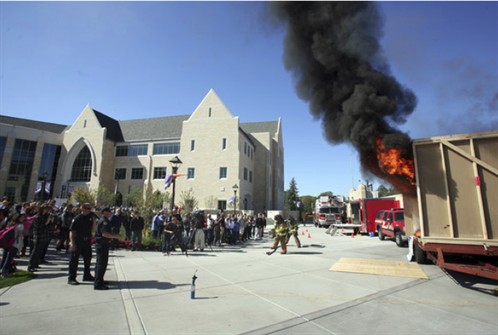Campus Fire Safety
While the information contained in this news article was current and accurate when we posted it, it may not necessarily represent current WVOEMS policy or procedure. If you have any questions, please contact our office at 304-558-3956.
Posted: Tuesday, September 9, 2014 9:29 AM
Campus Fire Safety

West Virginia Governor Earl Ray Tomblin has proclaimed September 2014 as Campus Fire Safety Month in West Virginia. This is in conjunction with the National Center for Campus Fire Safety which has designated September as "As students, faculty and staff at colleges and universities across the Mountain State return to campus for the semester ahead, it is important to remember the importance of fire safety," Gov. Tomblin said. "Campus Fire Safety Month gives us the opportunity to remind students of fire safety practices and ensure they have the knowledge and skills they need to protect themselves no matter where they live. Fires do happen in campus-related settings. By working together, we can raise fire safety awareness across West Virginia."
The following information is provided by the United States Fire Administration (USFA).
According to the United States Fire Administration (USFA), from January 2000 through June 2014, there were 166 fatal fires reported on or within 3 miles of a college campus, 144 of those victims died in off campus housing.
The Facts
- In cases where fire fatalities occurred on college campuses, alcohol was often a factor. There is a strong link between alcohol and fire deaths. In many adult fire fatalities, victims were under the influence at the time of the fire. Alcohol abuse often impairs judgment and hampers evacuation efforts.
- 72% of the reported fires involved cooking equipment. The most common time for fires is during the evening hours and on weekends.
The Fire Risks
- Four common factors in deadly campus fires are: lack of fire sprinkler systems; missing or disabled smoke alarms; careless disposal of smoking materials and impaired judgment from alcohol use.
- Misuse and carelessness with smoking materials and candles are the leading causes of civilian campus deaths from 2002-2005.
- Student apathy is prevalent. Many are unaware that fire is an actual risk or threat.
- Evacuation efforts are hindered since fire and smoke alarms are often ignored.
- Misuse of cooking appliances, overloaded electrical circuits and extension cords increase the risk of fires.
- Vandalized and improperly maintained smoke alarms and fire alarm systems inhibit early detection of fires as well as prompt evacuation.
Fire Safety Tips for Parents and Students
- Look for fully sprinklered housing when choosing a dorm or off-campus housing (most college fire deaths actually occur in off-campus housing).
- Never disable a smoke alarm or any other fire protection equipment. This is not only a crime, it endangers everyone in the building, and responding firefighters.
- Regularly inspect rooms and buildings for fire hazards. Ask your local fire department for assistance.
- Inspect exit doors and windows and make sure they're working properly.
- Students should know how to properly notify the fire department using the 911 system.
- Always participate in fire drills and practice escape routes and evacuation plans.
- Take EVERY alarm seriously-it could be the real event!
- Don't overload electrical outlets and use extension cords properly.
- Don't burn candles.
- Smoke only where allowed, and preferably outside the building.
- Check your school's rules about using electrical appliances in your room.
- Use a surge protector for your computer. Plug the protector directly into an outlet.
- Learn to properly use and maintain heating and cooking appliances.
NOTE: The Center for Campus Fire Safety is a non-profit organization devoted to reducing fires at campuses across the nation through education advocacy. A collection of free resources for campus fire safety professionals to use are available at the Center's website, including lesson plans, presentations and more. Visit the Center's website at www.campusfiresafety.org to learn more.
Additional information is also available through Campus Firewatch (www.campus-firewatch.com) and at www.igot2kno.org (College Fire Survival).
Websites to visit for
more information:
www.usfa.fema.gov www.nfpa.org www.campus-firewatch.com
See State Fire Marshall's press release below
